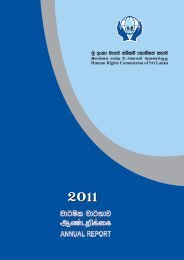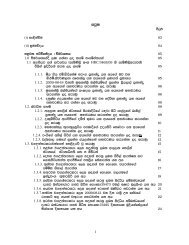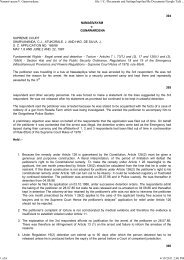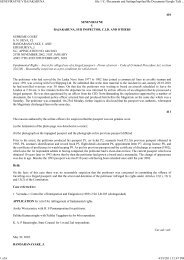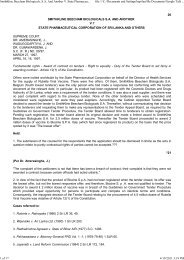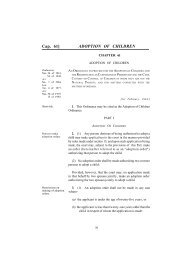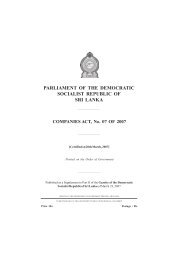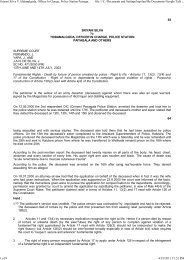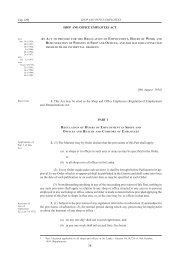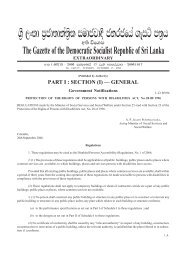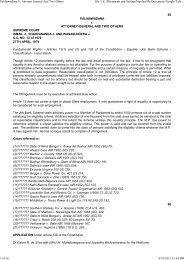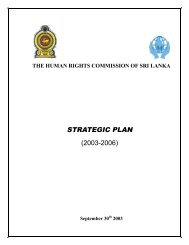Gamini Dissanayake (Petitio... - Human Rights Commission of Sri ...
Gamini Dissanayake (Petitio... - Human Rights Commission of Sri ...
Gamini Dissanayake (Petitio... - Human Rights Commission of Sri ...
Create successful ePaper yourself
Turn your PDF publications into a flip-book with our unique Google optimized e-Paper software.
<strong>Gamini</strong> <strong>Dissanayake</strong> (<strong>Petitio</strong>ner In Sc 4/91) V. Kaleel, M.C.M. And Others file:///C:/Documents and Settings/kapilan/My Documents/Google Talk ...<br />
GROUNDS URGED AGAINST THE EXPULSION<br />
The petitioners challenge the expulsion on three grounds namely,<br />
(a) absence <strong>of</strong> jurisdiction in the Working Committee ;<br />
(b) inconsistency with the provisions <strong>of</strong> the Constitution <strong>of</strong> <strong>Sri</strong> Lanka and Statute Law ;<br />
(c) breach <strong>of</strong> the rules <strong>of</strong> natural justice.<br />
They allege that the decision to expel them is mala fide.<br />
ABSENCE OF JURISDICTION IN THE WORKING COMMITTEE<br />
The two main constituent bodies <strong>of</strong> the UNP are the Party Convention and the National Executive Committee.<br />
The former is the largest representative body at national level and meets regularly once a year. The latter is the<br />
Administrative Authority <strong>of</strong> the Party at national level and consists <strong>of</strong> approximately 2500 members. Under Rule 8 (3)<br />
it has the power, inter alia, to take disciplinary action against any member in a manner suitable to the circumstances<br />
<strong>of</strong> each case and mete out punishment. The Working Committee is established by Rule 8 (3) (m) and is appointed by<br />
the Leader <strong>of</strong> the Party from the NEC consisting <strong>of</strong> himself, Deputy Leader and all other <strong>of</strong>fice bearers and any other<br />
members not exceeding fifty. The same rule confers on the Working Committee the authority to exercise the powers<br />
and functions vested in it by the NEC. By a resolution <strong>of</strong> the NEC dated 19.04.91 (R2) the Working Committee has<br />
been vested with full powers to carry out the responsibilities and functions <strong>of</strong> the NEC.<br />
Mr. H. L. de Silva, P.C. for the petitioners strenuously contends that under rule 8 (3) the power to take<br />
disciplinary action is vested solely in the NEC ; that such power being judicial or quasi judicial it can be exercised by<br />
the NEC alone ; that Rule 8 (3) (m) which provides for vesting <strong>of</strong> powers as opposed to delegation would enable<br />
the NEC to give away only its ancillary powers e.g. running <strong>of</strong> the Head <strong>of</strong>fice, fund raising or propaganda ;<br />
that R2 is a wholesale divesting by the NEC <strong>of</strong> its power vested in it by the UNP Constitution and the Working<br />
Committee cannot exercise such power in the absence <strong>of</strong> an amendment to the Constitution enabling the delegation<br />
<strong>of</strong> particular powers ; that R2 is outside the contemplation <strong>of</strong> Rule 8 (3) ; that even assuming the possibility <strong>of</strong> a<br />
delegation <strong>of</strong> powers, NEC cannot delegate its disciplinary power because Rule 8 (3) (m) is in general terms and<br />
gives no such power either expressly or by necessary implication. Mr. de Silva cited a number <strong>of</strong> decisions including<br />
Barnard v. National Dock Labour Board (35) ; Vine v. National Dock Labour Board (36) and Young v. Fife Regional<br />
Council (37). The first two cases relate to sub delegation <strong>of</strong> powers not authorised by statute. In the third case<br />
power was delegated without any authority therefor. In Vine's case Lord Somervell said -<br />
" I am, however, clear that the disciplinary powers whether " judicial " or not, cannot be delegated " (p. 951)<br />
In Young's case it was held that the delegation was not empowered expressly or by necessary implication and hence<br />
the decision made in virtue <strong>of</strong> delegation is a nullity ; per Lord Ross p. 334.<br />
Mr. de Silva further submits that the expulsion in P.1A being invalid, the NEC could not have validated it by its<br />
endorsement R5 ; he supports this with the decisions in Barnard's and Vine's cases (Supra) and Blackpool<br />
Corporation v. Locker (109).<br />
Mr. Choksy, P.C. for the respondents submits that in the cases cited by Mr. de Silva the power had been<br />
delegated without any authority therefor or there was held to exist an unauthorized sub-delegation <strong>of</strong> power ; here is<br />
a case where the power to delegate is conferred expressly by Rule 8 (3) (m) ; the word 'vest' appearing therein,<br />
properly construed in the context and as appearing in a non-statutory document, means "delegate" ; and hence the<br />
power may be withdrawn expressly by revoking R2, and there is no abdication <strong>of</strong> power by the NEC. He concedes<br />
that the power may even be impliedly withdrawn in the event <strong>of</strong> NEC resuming the exercise <strong>of</strong> power see Huth v.<br />
Clerk (110). Mr. Choksy contends that the power <strong>of</strong> delegation in Rule 8 (3) (m) is express and unqualified and the<br />
Court cannot by interpretation limit that power ; that in any event<br />
the power given by the said rule is by necessary implication very wide and is absolutely necessary for the<br />
proper functioning <strong>of</strong> the Party ; that it forms part <strong>of</strong> the contract between members <strong>of</strong> the Party which cannot be<br />
avoided unless it is contrary to public policy or the law. He argues that the petitioners cannot seek to vary it on the<br />
41 <strong>of</strong> 56 4/20/2011 1:18 PM<br />
216<br />
217



